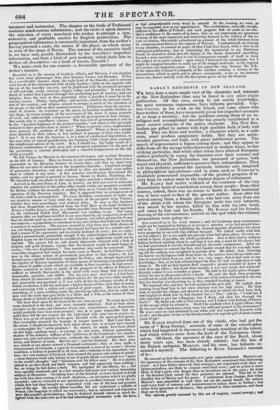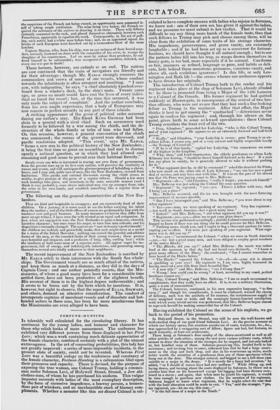EARLE'S RESIDENCE IN NEW ZEALAND.
W's have here a more ample view of the character. and manners of the New Zealanders than may be found in any other single publication. Of this race, owing to our scanty knowledge, the most erroneous impressions have hitherto prevailed. Cap- tain CRUISE, in his work on the Island, and some others who have written of them, have necessarily given but imperfect accounts of so large a territory; but the residence among them of an in- telligent and accomplished traveller has greatly contributed to a more correct estimate of the native character. The New Zea- landers are gifted by nature with high qualities both of body and mind. They are fierce and warlike ; a character which, in a rude state, must produce sanguinary habits. But they are noble- minded, generous, and kind, with great intellectual power. The march of improvement is begun among them ; and they appear to differ from all the savage tribes discovered in modern times, in this striking particular, that while other tribes have allowed European settlers gradually to usurp the dominion over their country and themselves, the New Zealanders are possessed of power, both moral and physical, sufficient to preserve their independence. They will thus probably present the spectacle, hitherto only imagined in philosophical speculations—and in some, such as Niznumes, absolutely pronounced impossible—of the gradual progress of so ciety from its rudest state to the highest degree of refinement. Mr. EARLE had ocular evidence of the existence of the very discreditable habit of cannibalism among these people : from other sources, indeed, there was no reason to doubt it—their testimony was at least equal to that of the present author. Soon after his arrival among them, a female slave, who had run away from one of the chiefs with whom the European party was very intimate, was seized by her master, killed by him with his own hand, and eaten by him and his friends. Mr. EARLE and his friends, hearing of the circumstance, arrived on the spot while the culinary preparations were going on- Atoi received us in his usual manner ; and his handsome open countenance could not be imagined to belong to so savage a monster as he had proved him- self to be. I shuddered at beholding the unusual quantity of potatoes his slaves were preparing to eat with this infernal banquet. We talked coolly with him on the subject ; for as we could not prevent what had taken place, we were re- solved to learn, if possible, the whole particulars. Atoi at first tried to make us believe he knew nothing about it, and that it was only a meal for his slaves ; but we had ascertained it was for himself and his favourite companions. After va- rious endeavours to conceal the fact, Atoi frankly owned that he was only wait- ing till the cooking was completed to partake of it. He added, that, knowing the horror we Europeans held these feasts in, the natives were always most anx- ious to conceal them from us, and he was very angry that it had come to our knowledge ; but, as he had acknowledged the fact, he had no objection to talk about it. He told us that human flesh required a greater number of hours to cook than any other ; that if not done enough, it was very tough, but when suf. fieiently cooked it was as tender as paper. He held in his band a piece of paper_ which lie tore in illustration of his remark. He said the flesh then preparing would not be ready till next morning ; but one of his sisters whispered in my ear, that her brother was deceiving us as they intended feasting at sunset. We inquired why and how -he us, murdered the poor girl. He replied, that running away from him to her own relations was her only crime. He then took us outside his village, and showed us the post to which she had been tied, and laughed to think how he had cheated her—" For," said he, " I told her I only intended to give her a flogging ; but I fired, and shot her through the heart !" My blood ran cold at this relation, and I looked with feelings of horror at the savage while he related it. Shall I be credited when I again affirm, that he was not only a handsome young man, but mild and genteel in his demeanour? He was a man we had admitted to our table, and was a general favourite with us all ; and the poor victim to his bloody cruelty was a pretty girl of about sixteen years of age !
Mr. EARLE received from one of the chiefs, who had got the name of " King George," accounts of some of the catastrophes which had happened to the crews of vessels touching at the island, and which always arose from the fault of the Europeans them- selves. Of these, the massacre of the crew of the Boyd, about thirty years ago, has been already related; but the fate of the French navigator MARION, and his crew, has hitherto re- mained a mystery. The following is KING GEORGE'S account of He assured us that the catastrophe was quite unpremeditated. Marion's en- tire ignorance of the customs of the New Zealanders occasioned that distressing event : as I have before observed, that strangers, not acquainted with their re- ligious prejudices, are likely to commit some fatal error; and no action is more likely to lead a party into danger than an incautious use of the seine ; for most of the beaches (best suited for that purpose) are tabooed. This led to the dreadful fate of Marion and his party.. I understood from George, that when Marion's men assembled to trail thew net on the, sacred beach, the natives used every kind of entreaty and remonstrance to induce them to forbear; but either from ignorance or obstinacy, they persisted in their intentions, and drew their net to land. The natives, greatly incensed by this act of impiety, vowed revenge ; and
the suspicions of the French not being roused, an opportunity soon presented it- self of taking ample retaliation. The seine being very heavy, the French re- quired the assistance of the natives in drawing it on shore. These wily fellows instantly consented to the task, and placed themselves alternately between each
• Frenchman, apparently to equalize the work. Consequently, in the act of pull- ing-, 'each native had a white man before him; and, on an appointed signal, the brains of each European were knocked out by a tremendous blow of the stone hatchet. Captain Marion, who, from his ship, was an eye-witness of these horrid mur- ders, instantly hastened on shore with the remainder of his crew, to avenge the -slaughter of his countrymen. Led on more by ardour than prudence, he suf. fered himself to be surrounded; was overpowerA by numbers,. defeated, and every one was put to death ! These horrors, however, are entirely at an end. The natives are now convinced that the visits of navigators are friendly and for their advantage ; though Mr. EARLE strongly censures the commanders and crews of many of our vessels, whose conduct towards the inhabitants is often arrogant and insulting. " I once saw, with indignation," he says, "a chief absolutely knocked over- board from a whaler's deck, by. the ship's mate. Twenty years ago, so gross an insult would have cost the lives of every indivi- dual on board the vessel ; but, at the time this occurred, it was only made the subject of complaint." And the author concludes, from his own ample experience, that a body of Europeans may now remain in perfect security in any part of these islands. A striking appearance of the germ of political order occurred during our author's stay. His friend KING GEORGE had been slain in a quarrel with a rival chief. Such an occurrence used formerly to be followed by a war among the chiefs, and the de- struction of the whole family or tribe of him who had fallen. On this occasion, however, a general convocation of the chiefs was summoned ; the causes of the quarrel were discussed, and pacific resolutions adopted. "This event," says Mr. EARLE, " forms a new mra in the political history of the New Zealanders ; it being the first time so great an assemblage had met to discuss openly a national question, or in which they had allowed cool reasoning and good sense to prevail over their habitual ferocity."
Surely every one who is interested in tracing our own form of government, from the present time up to its first rude outline, will perceive the similarity of " causes and events, and will anticipate the glorious prospect of beholding a clever, brave, and I may add, noble race of men, like the New Zealanders, rescued from barbarism. This pacific and rational discussion among the chiefs seems, in reality, to give promise of the germ of a regular reform. Should a few more such meetings take place, and terminate in the same amicable manner (and I think it very probable), sonic clever individual may rise up amongst them, take the reins in his own hands, and establish something like a regular form of government.
The following are the general characteristics of the New Zea- landers.
They are kind and hospitable to strangers; and are excessively fond of their children. On a journey, it is more usual to see the father carrying his infant than the mother ; and all the little offices of a nurse are performed by him with the tenderest care and good 'humour. In many instances (wherein they differ from most savage tribes), I have seen the wife treated as an equal and companion. In fact, when not engaged in war, the New Zealander is quite a domestic, cheerful, harmless character ; but once rouse his anger, or turn him into ridicule, and his disposition is instantly changed. The natives are "cast in beauty's perfectmould :" the children are so finely and powerfully made, that each might serve as a model for a statue of the Infant Hercules ; nothing can exceed the graceful and athletic . forms of 'the men, or the rounded limbs of their young women ; these possess eyes beautiful and eloquent, and a profusion ef long, silky, curling hair ; while the intellects of both sexes seem of a superior order. All appear eager for im- provement, full of energy, and indefatigably industrious, and possessing among • themselves several arts totally unknown to their neighbours.
The recent improvement of the New Zealanders is ascribed by Mr. EARLE solely to their intercourse with the South Sea whale- . ships. The Government vessels are as much afraid of the natives, and keep them as much at a distance, as they did in the days of Captain COOK: and our author pointedly asserts, that the Mis- sionaries, of whom a good many have been for a considerable time settled there, have not been productive of the slightest benefit. . His account of them is in the highest degree unfavourable ; and it seems to be borne out by the facts which he mentions. It is, however, but right to observe, that the reports of ELLIS, STEWART, and others, demand an attentive consideration. The conduct of intemperate captains of merchant vessels and of dissolute and hot- headed sailors in these seas, has been far more mischievous than the Missionaries are even alleged to have been.




























 Previous page
Previous page